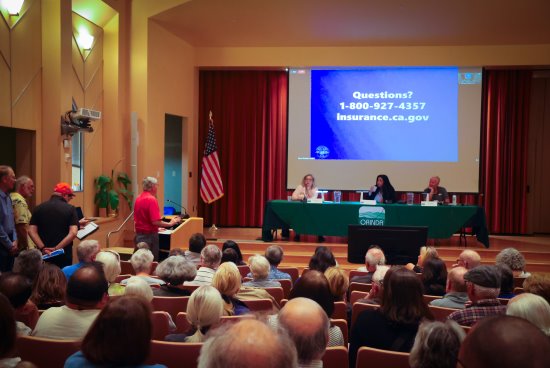
| ||||||
"The Department of Insurance is the consumer protection agency for the nation's largest insurance marketplace, so all of our functions, including overseeing insurer solvency, licensing agents and brokers, resolving consumer complaints, and investigating and prosecuting insurance fraud are to protect consumers. However, it's important for me to point out one thing we cannot do, which is to require or compel insurance companies to sell insurance to a particular person or community."
State Farm General's recent announcement that they would not be renewing approximately 30,000 homeowners' policies in the State raises serious questions about the company's financial situation, among other concerns. Strange said the California insurance department has been working with State Farm's home company in Illinois to get a picture of the company's financial profile and plans for improvement. Strange said homeowners receiving notices of non-renewal will have time to replace coverage and the department will assist with any cases in which a 75-day replacement allowance is not provided by a company canceling or not renewing coverage.
There is wide public awareness that the insurance market is facing unusual pressure as inflation impacts the costs of rebuilding, and increased environmental risks such as wildfires and floods cause companies to restrict coverage areas. According to Strange, 12 insurance groups cover 85% of the homeowners market in California. Of those 12, seven insurance companies have paused or restricted new business since 2022, despite approved rate increases that might, at other times, have mitigated the need for cautionary measures. The state's FAIR Plan, originally designed as "last resort" coverage, has become first resort for more of the market; in part because commercial insurance companies can legally refuse to write policies unless they can cover 100% of the consumer claims, cover their own expenses, and earn a fair return.
Strange reviewed the new regulations approved in October 2022 and implemented in 2023 that include a wildfire framework to reduce wildfire risk for homeowners to follow. The three-step system protects properties and provides consumers with insurance discounts and access to their risk ratings. Wildfire safety actions begin with common measures such as having an Class A fire-rated roof, enclosed eves, a 5-foot ember-resistant zone around all buildings, and other measures. Protection extends to trimming trees and clearing vegetation and debris within five feet of any buildings being evaluated. Obtaining community-level rate reductions applied to entire neighborhoods or areas means having an approved Firewise USA site or other local safe space designation.
With the new regulations coming -- a result of the department's California Sustainable Insurance Strategy that implements major reforms in accordance with Governor Gavin Newsom's executive order -- the FAIR plan will expand. "They have actually offered up to a 10% discount on policies in participating Firewise communities since May of 2018," said Strange. "Now, with this regulation, they are offering two more partnering discounts. One for step one, which was protecting your structure, and another for protecting the immediate surroundings of the dwelling." When applied, the discounts could reduce the wildfire portion of a policy by 14.5%. The discounts also extend to HOAs, and several commercial categories.
Other details of the new regulations involve consumers' right to receive and contest risk rating scores, executive action reforms such as increasing the number of policies insurance companies are required to offer in high-wildfire risk areas, protection from consumers having to pay for global catastrophes, updates to the models used for determining appropriately priced rates, and more.
Strange said the department has an online tool to help homeowners and other residential property owners find insurance companies. Included in the "top ten tips" are links to resources and contact numbers. A consumer hotline for information about filing complaints (1-800-927-4357) and a live chat feature provide opportunity for consumer questions.
Council asked Strange about the timing for insurance companies expressing intentions to resume writing policies. She said the department is scheduled to compete its reforms by December and an agreement included will mean companies will be implementing the changes within the months following. Efforts to streamline the process and allow for faster approvals for rating plans have been workshopped, but the timing for full implementation is partially dependent on the companies and, therefore, is difficult to forecast. Strange said companies are under no obligation to wait until all of the regulations are implemented and can begin to write new policies at any time at their own discretion. The council received the update and urged Strange and the department to move forward quickly on this issue vital to Lafayette residents and property owners.
Reach the reporter at:
